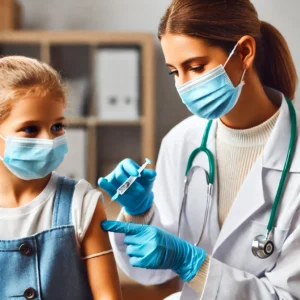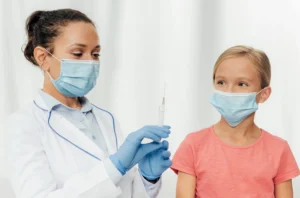Vaccine and Immunization
Vaccines and immunizations are essential components of public health, significantly contributing to the prevention of infectious diseases. By stimulating the immune system to recognize and combat pathogens, vaccines protect both individuals and communities. This proactive approach not only safeguards children’s health but also plays a crucial role in the broader effort to eradicate diseases that have historically posed serious threats. Understanding the importance of vaccines, their recommended schedules, and addressing common misconceptions is vital for parents and caregivers in making informed health decisions for their children.

Vaccine and Immunization Schedules for Children
Vaccination schedules are carefully designed timelines that outline the recommended ages for administering vaccines to children, ensuring they receive the necessary immunizations at optimal times to build robust immunity against various diseases. The Centers for Disease Control and Prevention (CDC) provides guidelines that include key vaccines for different age groups. In infancy (0-12 months), essential vaccines include Hepatitis B, DTaP (diphtheria, tetanus, and pertussis), Hib (Haemophilus influenzae type b), IPV (inactivated poliovirus), and PCV (pneumococcal conjugate vaccine). During early childhood (1-5 years), additional doses of DTaP, IPV, MMR (measles, mumps, rubella), and Varicella (chickenpox) are typically administered. As children reach school age (6-18 years), they may receive boosters for Tdap (tetanus, diphtheria, and pertussis), along with vaccines for HPV (human papillomavirus) and meningococcal disease, particularly before entering middle school or high school. Adhering to these schedules is crucial, as timely vaccinations help protect children from serious health risks. Regular check-ups with a pediatrician ensure that vaccinations remain up to date and allow parents to address any questions about the schedule. By following the recommended vaccine schedules, families contribute to the overall health and safety of their community.

Immunization and Vaccine Schedules for Children
-
Importance of Immunization
Immunization is a vital public health strategy that protects children from infectious diseases. By using vaccines, the immune system learns to recognize and combat specific pathogens, ensuring protection without causing illness.
-
Overview of Vaccine Schedules
Vaccine schedules are guidelines that specify the recommended ages for vaccinations. These schedules are crucial for ensuring that children receive their immunizations at the appropriate times and are based on the latest research from organizations like the Centers for Disease Control and Prevention (CDC).
-
Vaccines for Infants (0-12 months)
- Hepatitis B
- DTaP (diphtheria, tetanus, and pertussis)
- Hib (Haemophilus influenzae type b)
- IPV (inactivated poliovirus)
- PCV (pneumococcal conjugate vaccine)
- These vaccines establish a strong immune foundation.
-
Vaccines for Early Childhood (1-5 years)
- Additional DTaP doses
- IPV booster
- MMR (measles, mumps, rubella)
- Varicella (chickenpox)
These vaccinations are essential for preventing serious diseases.
-
Vaccines for School Age (6-18 years)
- Booster for Tdap
- HPV (human papillomavirus)
- Meningococcal disease vaccine
These vaccines prepare children for middle and high school.
-
Regular Health Consultations
Parents need to consult healthcare providers regularly to ensure that vaccinations are up to date. This allows for timely immunizations and addresses any questions or concerns regarding the vaccine schedule.
Aِِِِِِِِِِdhering to immunization and vaccine schedules is crucial for safeguarding children against preventable diseases. Timely vaccinations not only protect individual health but also contribute to community well-being by reducing the spread of infections. Parents play an essential role in this process by ensuring their children receive the necessary immunizations at the appropriate ages. By prioritizing these health measures, families can foster a healthier future for their children and help create a safer environment for all. Regular consultations with healthcare providers further enhance this commitment, enabling informed decisions about vaccination and overall health.
Book an Appointment
Frequently Asked Questions
If you have any further questions or need additional information, please don’t hesitate to reach out. Best regards, Fayrouz.